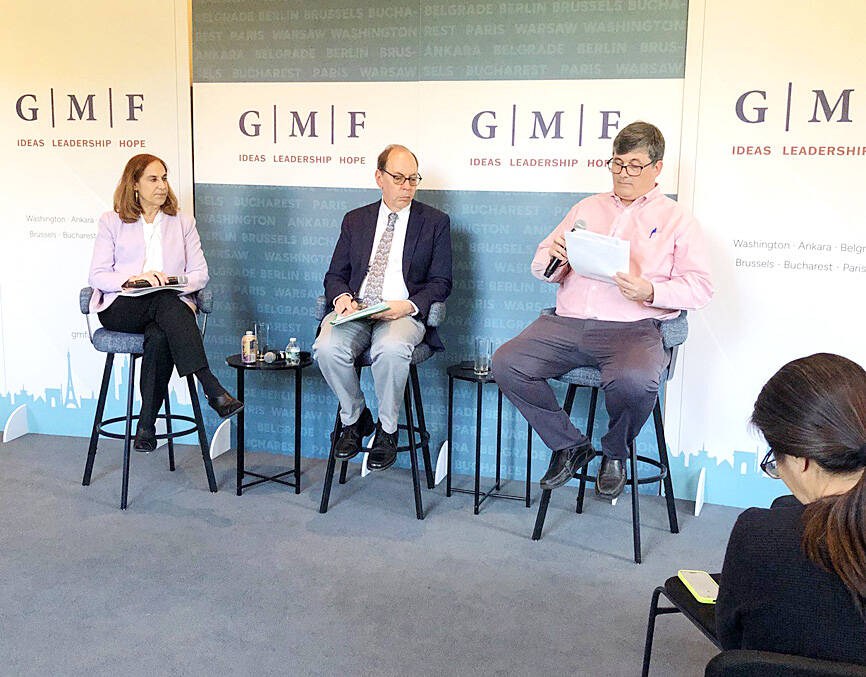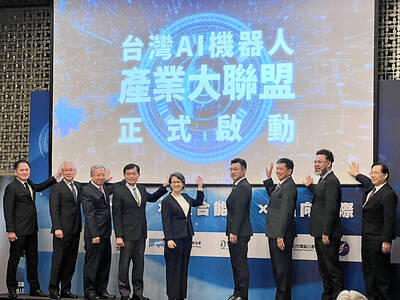China is mischaracterizing UN Resolution 2758 for its own interests by conflating it with its “one China” principle, US Deputy Assistant Secretary for China and Taiwan Mark Lambert said on Monday.
Speaking at a seminar held by the German Marshall Fund, Lambert called for support for Taiwan’s meaningful participation in the international community at a time when China is increasingly misusing Resolution 2758.
The resolution had a clear impact when it changed who occupied the China seat at the UN, Lambert said.

Photo: CNA
“Today, however, the PRC [People’s Republic of China] increasingly mischaracterizes and misuses Resolution 2758 to serve its own interests,” Lambert said.
“Beijing mischaracterizes the resolution by falsely conflating it with China’s ‘one China’ principle, and wrongly asserts that it reflects an international consensus for its ‘one China’ principle,” he added.
Resolution 2758 was adopted by the 26th UN General Assembly in 1971 to solve the issue of China’s representation in the UN system. It ultimately led to the UN expelling the Republic of China, and the PRC taking its place.
The resolution passed on Oct. 25, 1971, recognizes the PRC as the “only lawful representative of China.”
However, the governments of Taiwan and the US have repeatedly said that it does not mention Taiwan, does not state that Taiwan is part of the PRC, and does not explicitly authorize Beijing to represent Taiwan in the UN system.
Lambert said the “one China” principle refers specifically to China’s position that it claims Taiwan to be part of China.
“To be clear, Resolution 2758 has absolutely no bearing on countries’ sovereign choices with respect to their relationships with Taiwan. Such decisions are clearly outside of the UN General Assembly’s purview to dictate,” he said.
Lambert emphasized that China was aiming to influence decisions made by partner countries regarding their relationships with Taiwan by conflating Resolution 2758 with its “one China” principle.
The resolution does not constitute an institutional UN position on the political status of Taiwan, and does not preclude Taiwan’s meaningful participation in the UN system and other multilateral fora, he said.
“Through its misuse of Resolution 2758, China has denied the international community the ability to gain from Taiwan’s valuable contributions to global challenges, which require us all to work together,” Lambert said.
He said that a good step would be inviting Taiwan to participate as an observer in the World Health Assembly slated for next month so that it could join efforts in fighting emerging health threats and planning for global health challenges.
Had Taiwan been able to share its knowledge of public health ahead of the COVID-19 outbreak, “the world might have been a very different place. Taiwan’s exclusion from key international fora has a direct negative impact on the well-being of the global community,” Lambert said.
Meanwhile, US Representative John Moolenaar, the new chair of the US House of Representatives Select Committee on Strategic Competition between the US and the Chinese Communist Party (CCP), in a video on Monday vowed to deter Chinese military aggression against Taiwan.
Moolenaar said he would continue to counter Chinese efforts to “weaken America,” citing its use of TikTok to “indoctrinate our children,” buying farmland and setting up secret police stations abroad.
As a first priority, Moolenaar said that the committee would “work tirelessly to deter CCP military aggression against Taiwan and our allies in the Indo-Pacific.”
It would also work to prevent the CCP from stealing technology and harassing people on US soil, while examining how to reduce supply chain reliance on China, he said.
Additionally, “we will continue to promote engagement and partnerships with allies around the world,” Moolenaar said as the video showed footage of him shaking hands with President Tsai Ing-wen (蔡英文).
Additional reporting by Kayleigh Madjar

The paramount chief of a volcanic island in Vanuatu yesterday said that he was “very impressed” by a UN court’s declaration that countries must tackle climate change. Vanuatu spearheaded the legal case at the International Court of Justice in The Hague, Netherlands, which on Wednesday ruled that countries have a duty to protect against the threat of a warming planet. “I’m very impressed,” George Bumseng, the top chief of the Pacific archipelago’s island of Ambrym, told reporters in the capital, Port Vila. “We have been waiting for this decision for a long time because we have been victims of this climate change for

MASSIVE LOSS: If the next recall votes also fail, it would signal that the administration of President William Lai would continue to face strong resistance within the legislature The results of recall votes yesterday dealt a blow to the Democratic Progressive Party’s (DPP) efforts to overturn the opposition-controlled legislature, as all 24 Chinese Nationalist Party (KMT) lawmakers survived the recall bids. Backed by President William Lai’s (賴清德) DPP, civic groups led the recall drive, seeking to remove 31 out of 39 KMT lawmakers from the 113-seat legislature, in which the KMT and the Taiwan People’s Party (TPP) together hold a majority with 62 seats, while the DPP holds 51 seats. The scale of the recall elections was unprecedented, with another seven KMT lawmakers facing similar votes on Aug. 23. For a

Taiwan must invest in artificial intelligence (AI) and robotics to keep abreast of the next technological leap toward automation, Vice President Hsiao Bi-khim (蕭美琴) said at the luanch ceremony of Taiwan AI and Robots Alliance yesterday. The world is on the cusp of a new industrial revolution centered on AI and robotics, which would likely lead to a thorough transformation of human society, she told an event marking the establishment of a national AI and robotics alliance in Taipei. The arrival of the next industrial revolution could be a matter of years, she said. The pace of automation in the global economy can

All 24 lawmakers of the main opposition Chinese Nationalists Party (KMT) on Saturday survived historical nationwide recall elections, ensuring that the KMT along with Taiwan People’s Party (TPP) lawmakers will maintain opposition control of the legislature. Recall votes against all 24 KMT lawmakers as well as Hsinchu Mayor Ann Kao (高虹安) and KMT legislative caucus whip Fu Kun-chi (傅崐萁) failed to pass, according to Central Election Commission (CEC) figures. In only six of the 24 recall votes did the ballots cast in favor of the recall even meet the threshold of 25 percent of eligible voters needed for the recall to pass,